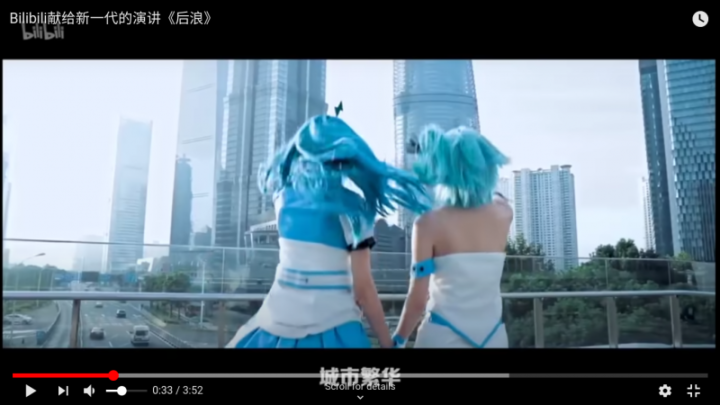A propaganda video addressing the country’s “back wave” triggered a backlash
Chinese officials are keen to make the country’s younger generation feel fortunate for what it has, and it isn’t difficult to see why.
The post-90s generation is the least happy among all age groups in China according to research by the Chinese Academy of Social Sciences, followed by the post-80s generation.
Many face stress related to housing issues, education, healthcare, employment, excessive exposure to social media and identity crises.
While the Chinese Communist Party has been able to contain dissatisfaction among mainland youth it is wary of the example set by Hong Kong, which was roiled by months-long, student-led protests.
Step in actor He Bing, a representative of China’s “Front Wave” (older generation) and the star of a viral video titled “Back Wave” (后浪) that aims to celebrate the supposedly free culture and bright future of China’s youth.
Released on China’s largest animated video sharing platform Bilibili in time for Chinese Youth Day (May 4), the video was republished by a plethora of state affiliated media outlets.
In the four-minute clip featuring footage of urban youth culture and adventurous, cosmopolitan lifestyles, actor He tells the younger generation:
Young internet users smelled paternalistic propaganda straight away.
They noted that the liberal, cosmopolitan culture depicted in the video was applicable only to a minority of young people, chiefly those who inherited wealth from the emergent business class (Capitalists), or politically powerful (Red) parents.
One typical comment on Weibo, the Chinese microblogging platform, pointed out that not everything is better for young people:
Infiltrating the subculture
The video’s appearance on Bilibili — posted by the website itself — is notable.
The platform is considered China’s most popular youth subculture website with 130 million monthly active users. Bilibi was listed on the U.S NASDAQ stock market in 2018 and is keen to rival more mainstream Chinese video platforms like Tencent Video. The majority of its audience was born after the 1980s and tends towards Japanese, Korean and American popular culture.
The China Communist Youth League established its official channel on the website in January 2017 and has been actively appropriating the youth community’s subculture in its political propaganda ever since.
That move came amid the emergence of a new generation of online patriots, dubbed Little Pink, who boost state narratives and conflate freedom with the boom in consumerist culture.
State-owned outlets that republished “Back Wave” included the People’s Daily and China Daily, while posts hailing the success of younger generations soon proliferated on Chinese social media, using the “Back Wave” hashtag.
But despite strong orchestration from party loyalists, the video triggered strongly negative emotions among some viewers.
According to a social media analysis report published by online media outlet The Paper, around half of the comments under the People Daily’s republication of the video were negative.
Name-checked prominently in critiques of the video were “Chinese Chives” (韭菜) — a vegetable that grows like wild grass and can be harvested by farmers regularly without much effort.
Originally used as a metaphor for Chinese who kept losing money in the stock market, the “chives” moniker has since been used to describe ordinary citizens that live happily, despite lacking human rights and suffering exploitation.
The ‘Chives’ strike back?
Many users responding to the Youth Day video viewed themselves as part of a “Chives Wave”, rather than a “back wave”.
One tech blogger described the video as “poisonous Chicken soup”:
The wealthy ones are the back wave, the poor ones are “Chinese Chives”. Some said the video “Back Wave” is a declaration of youth. The content is rosy but not realistic, glorious but not touching. In reality, how many young people can afford to live like this? The content does not capture the general social reality. Criticism of “Back Wave” is a moment of awakening for Chinese young people — it is a resistance against “poisonous Chicken soup”.
A “Back Wave” parody soon went viral on Bilibili. It replaced He Bing’s speech with a description of the “Chives Wave” — a generation that enjoys being exploited.
Below is a version published on YouTube:
You have the rights that we have eliminated — the right to be exploited. You don’t have the right to speak out. […] You are lucky to be in this era and Second Generation Rich are happy to meet you. They pay tribute to you, to you being naive and dumb. You have turned your own wealth into the wealth of your boss, turned the social into the capital, turned right into wrong and white into black. You have contributed bricks used for the construction of millions of overseas properties owned by the Second Generation Reds. You have contributed the oil used in the Benz owned by the Third Generation Reds who are racing outside the Forbidden City. You have turned your own bodies into 996 (9am to 9pm daily, six days per week) working machines which will eventually end up in an Intensive Care Unit.
Other parodies have emerged since, including this one about the Hong Kong protests for freedom and autonomy:
The debate surrounding the Youth Day video reminded some Chinese netizens to reflect on the genuine meaning of freedom and rights.
@CalvinChiu, a mainland Chinese tweeted:
后浪拍的特别好。
我们青年有旅行的自由,那请问其他自由为何绝口不提?
我们青年有学习一门语言知识的权利,那有没有其他权利呢?
中国的青年,被房子、车子禁锢起来,无心国事,这是何等的悲哀!权利是靠自己争取来的,而不是坐着等来的。
中国青年应该大胆地喊出来,我们要新闻自由!— Calvin Chiu (@CalvinChiu19) May 11, 2020
The production quality of Back Wave is excellent. We the youth have freedom to travel, but why are there no mentions of other freedoms? We the youth have the right to learn different languages — do we enjoy other rights? Youth in China has been locked up by properties and vehicles and does not care about politics. This is sad. We have to struggle for our rights, not sit there and wait. Youth in China should yell out — we want freedom of press!










